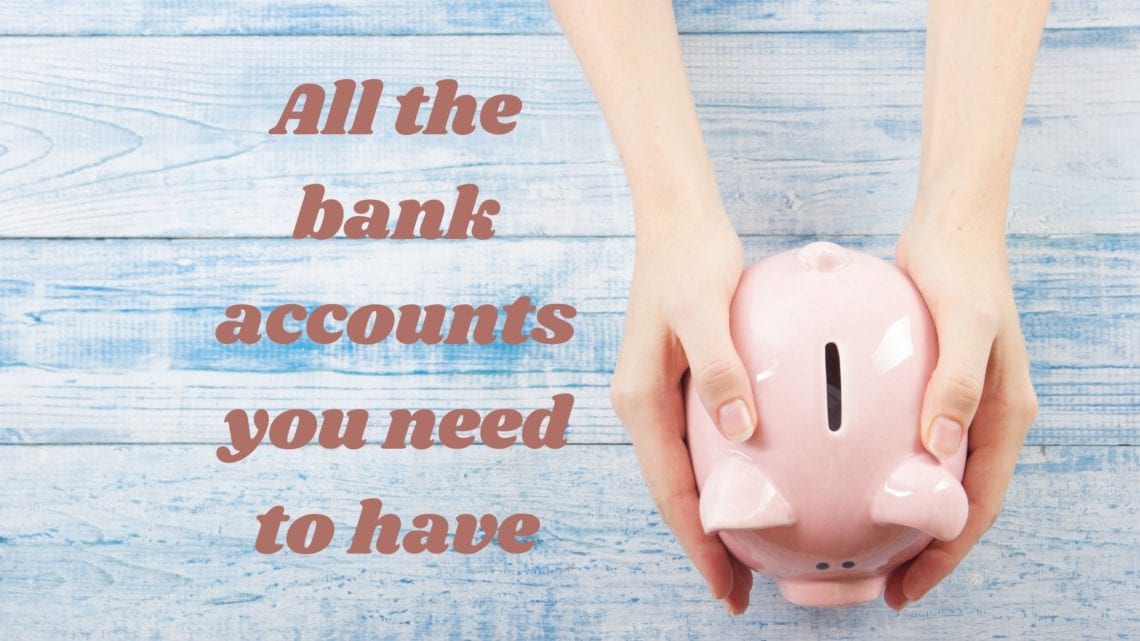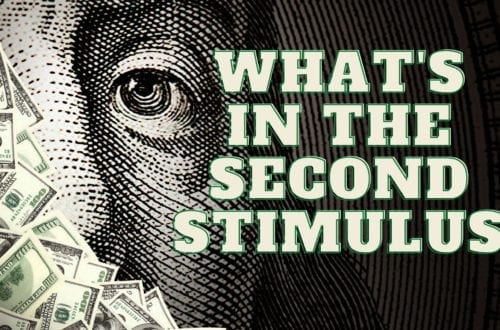
The 6 Bank Accounts That You Need
As an Amazon Associate I earn from qualifying purchases. We may earn money or products from other companies mentioned in this post at no cost to you!
Reading Time: 6 minutesDid you know that having multiple bank accounts can actually help you stick to a budget?
When you left high school, you probably had a standard checking account and savings account to start managing money in your new adult life. And honestly, myself included, the savings account was probably not actually being used like a real savings account!
If you’re still using these same two accounts, you need to change that now! I’m going to show you how to take your money management skills to a higher level that will help you track your spending better, how it works hand-in-hand with your budget, and will ultimately help you be more financially successful.
Checking account #1: Bill pay account
This account is just a plain checking account that is used for bills ONLY. When you have recurring expenses, like a phone bill or subscriptions, they should be coming out of this account. If you write a check for rent, it should come out of this account.
You should only keep as much money in this account as you know is going to be taken out of it because of your automated expenses or a check clearing. This way, you avoid overdraft fees since there will always be enough money in there for those bills. If you were paying for groceries and writing checks out of the same account, chances are that you’ll have issues. Better to have this account that’s supposed to essentially run to zero every month.
Checking account #2: Family spending account
This account should have your budgeted amount for groceries and miscellaneous spending (see my budgeting article). I call this the “house account”.
You should have a debit card for this account since it will be the one you use the most.
Your miscellaneous spending money is in this account, and will have everything in it that you’ve budgeted for date nights, hair cuts, family outings, etc. I tend to lump all these budgeted items into this account because it’s easier (and more secure) than carrying around envelopes of cash.
My only caveat for this account would be that maybe you should have some separation of your miscellaneous spending from your grocery budget so you never run out of money for food!
Checking account #3 (or #3a and #3b, if you’re married): Individual checking accounts
If you don’t know what this account is, see my article about having money that’s your own when you’re married. I swear, this is critical in successfully managing your money when you’re married.
To briefly explain, if you’re married, you should be budgeting “his and hers” money and putting into each other’s respective accounts. This is money that can be spent by each other on whatever without having to first check with the spouse.
Even if you’re not married, you should still have this account for spending outside of your necessary budgeted items because this will help you keep your “fun” money separate from the money you need for haircuts and groceries.
This is also the account to accumulate money for larger, more frivolous expenses that would fall under a personal want vs. a family need. For me, that would be skis. 🙂
Savings account #1: Short-term saving accounts
In my “short-term savings” account, I try to keep 3-6 months of expenses in it. I call it short-term savings because it’s purpose is a little different than a what you would normally think of for a savings account.
I prefer to use this account for purchasing large items, kind of like a “sinking fund” but without a specific purpose. Sinking funds are more for saving up to a certain limit in that account and then purchase the item being saved for. With this account, I recommend saving up to a certain limit but the funds are used for more spontaneous large purchases rather than planned ones.

You should add to this account with every paycheck to save for those bigger purchases: a remodel project, family vacation, new couch, new mattress, and other things like that. Any time I come in under budget in any category, like utilities, I stash the extra into this, too, because it gets me to my goal that much faster.
If you do have a specific purpose for the savings, you could actually have several of these. I personally keep at least two of these, some times more. I have one that’s used for vacations, and the other one that is for any other high dollar item that I want. That way, I’m always saving up for a vacation and not constantly putting it off because I used the money for something else.
The point is to have at least one of this type of account so you’re not having to dip into emergency savings for a couch.
Savings account #2: Emergency savings account
This account is obviously for emergencies, as the name implies.
I suggest keeping the equivalent of 15-18 months worth of expenses in it, or at least a minimum of 12. If you don’t know how much you need to survive for 12 months without a job then you need to budget and figure it out. This is important if you have a long-term emergency and are unable to bring in income for an extended period of time.
It could be that you’re in a toxic work environment and need to quit your job before you have another one secured. Think of it like boss insurance, too!
The amount for 12 months worth of expenses should be your baseline- never go below that amount. This gives you the 12 months of living expenses if you should lose your job and be out of work for that long, plus 3-6 months worth of expenses if you also have an emergency like a water heater failing.
When you use the extra money above the 12 month amount, then you need work on replenishing that account for your next expensive but short-term emergency.
One more note about this account is that I recommend this be put in an institution that’s not the same as your other accounts. Make it hard for you to access by using a branch location that’s not easy for you to get to, or use an online-only bank like CIT Bank.
Preferably, you should fund this through a direct deposit from every paycheck so you never even see the money and then be tempted to use it. If your work doesn’t do direct deposit, then be sure you transfer this money as soon as you get your check.
I recommend not having debit cards for this account either. You can connect this account with your regular checking account electronically for when you do need to use it, or write a check. It usually takes about three days for either the transfer of funds or for the check to clear when you do actually have an emergency.
HSA
HSA is short for “health savings account”. It is for what it sounds like: health. Most people are introduced to these accounts through their employee benefits, but you can also open a HSA even if you’re not insured through your place of work. This account is a little nuanced so bear with me as I explain it.
For starters, you can’t open an official HSA account unless you have a high deductible health plan (HDHP). Here’s a link to see what qualifies as a HDHP. If you don’t have a plan like this, then you won’t be able to contribute to a HSA.
The money in this account can ONLY be used for medical expenses like co-pays, orthodontics, prescriptions, etc. Otherwise, you pay your normal tax rate on your withdrawal PLUS a 20% penalty!
You are only allowed to contribute a certain amount to this account each year. Otherwise, if you put too much in, you pay a penalty. For 2021, families can contribute $7,200, and individuals can contribute $3,600.
Anyone over 55 can also contribute an additional $1,000. Again, check on this each year as the IRS can change the allowable limits (here’s the link again).
Keep in mind that the family contribution is per family, not necessarily per person in that family. As an individual with your own HDHP and HSA account through your employer, and your husband has a family one through his employer, the $7,200 includes both of your contributions in your separate accounts, so don’t overfund it.
HSA’s are what is known as a triple tax-advantaged account: money goes in pre-tax, so your contributions lower your taxable income; the gains you make on investments in that account are also tax-free, similar to a Roth IRA; and the withdrawals for qualified medical expenses are also not taxed. Win, win, win!
Closing Thoughts
To wrap it up, here’s the list of accounts that you need:
- checking account for only paying bills
- checking account for other budgeted expenses
- individual checking spending account (one for husband and wife, if married)
- short-term savings (aka “sinking funds”)
- emergency/long-term savings account
- HSA (health savings account)
Like I touched on briefly, this could actually be more than six accounts, but they should be multiples of the accounts listed here.
Shop around for a bank or banks that will help you with this process. Use a comparison service like SuperMoney to find a higher earning account for your long-term savings. SuperMoney also compares different terms, such as which one requires a low opening deposit. Find the places that are going to be the best fit for you!
It may seem like a lot of accounts to manage when you read this, but once you’ve tried it, you’ll realize how much easier it is to actually stick to your budget, I promise!
RELATED
See related: What Combining Finances Really Means
See related: 6 Simple Steps to Start Your Savings
IF YOU WANT TO SEE MORE…
Consider subscribing to my e-mail list. You can always unsubscribe, I won’t spam you!
Follow me on Facebook, Instagram, or Twitter.
Save this post on Pinterest by using the share buttons, and follow me, too!
If you want to start a blogging business, check out this FREE course!
If you want to make money from a blog, check out this program that got me started making my own money blogging!






20 Comments
Kendra
Such a great idea to have a separate bill pay account! Great banking ideas here!
Sabrina DeWalt
I have three accounts, but am vigilant in keeping track of what money is designated for what use in each account.
Ashley
I think Ally actually allows you to have “buckets” in your accounts so you can segregate your money without having to open multiples of the same account.
Sandi Barrett
These are good suggestions, others could include business accounts, accounts you share with elderly relatives, and accounts you share with children.
Ashley
Very true! You should have multiples of the accounts, for sure!
Barbara
Very good advice!
Ashley
Thank you!
bluray
This is my first time pay a quick visit at here and i am really impressed to read everthing at alone place. Tobe Vladamir Ehr
720p
Really enjoyed this blog post. Much thanks again. Want more. Matty Alyosha Timothea
online
Wow, superb blog layout! How long have you been blogging for? you made blogging look easy. The overall look of your web site is great, let alone the content!| Inga Dalis Ambrosi
torrent
This is the perfect post for me to find at this time Katharyn Dukey Thibault
mbc.coach
Howdy! This is kind of off topic but I need some guidance from an established blog.
Is it difficult to set up your own blog? I’m not very techincal but I can figure things out pretty quick.
I’m thinking about making my own but I’m
not sure where to begin. Do you have any points or suggestions?
Thanks
Alyssa
Great post! I never really meant to have a bunch of different accounts but I guess I’m doing it right!
BearMoney Dan
When I read articles like this I’m like sure makes total sense, then I imagine what the older banking must have been like, three accounts probably took 3 weeks at your firstborn to set up. Modern visibility and flexibility in banking is great.
Ashley
We have it easy, definitely.
Steve @ The Frugal Expat
Hey Ashley,
Great post! I was thinking about your thoughts on an HSA. You point out that it is a type of bank account. I wonder what your thoughts about using your HSA as an investment account. I know through Fidelity you can invest that money into index funds, and then hold onto health-related receipts for a long period of time to allow that money to grown. The cool thing is that at age 65 you can take all of that money out tax-free without using it for health-related.
Great post!
Ashley
I have a post just about HSA’s. 🙂 https://www.commoncentslifestyle.com/hsa-or-fsa/ They are one of my favorite investment accounts.
manhwaland
Great, thanks for sharing this article.Much thanks again.
Adam Wilson
I like the commentary on HSA accounts. Some people think they can’t have an HSA unless it’s part of their employer’s benefits. However, you may be able to open one on your own.
Bea
I blog quite often and I seriously appreciate your information. Your article has really
peaked my interest. I am going to book mark your blog and keep checking for new
details about once a week. I subscribed to your Feed as well.